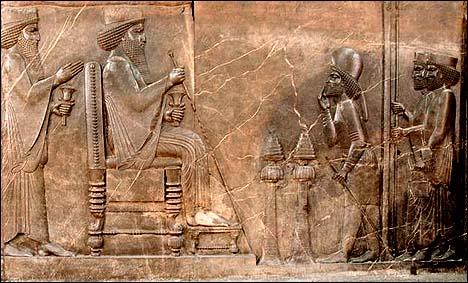Part IV.
Law,
Police, Punishments, and the Arenas. (Continued)
 |
|
Pecháni Magistrate
issuing a verdict.
Carving on the walls of the House of Enlightened Justice,
Teshkóa.
|
Civil
courts deal with altercations between clans, temples, individuals, and other
legal entities. Assault, robbery, rape, murder, kidnapping, brawling, and other
crimes of violence fall into this category, as do suits involving breaches of
contract (including marriage agreements), divorce, clan rights, disputes over
land or water ownership or usage, embezzlement, fraud, imposture, inheritance,
personal slander, and many other kinds of illegalities.
Whenever a civil offence is
committed the complainant has three means of redress: (1) he can demand Shámtla
–“blood-money”-- from the offender; (2) he may take the case to a civil court,
which holds a hearing and imposes a settlement and/or penalties; (3) he may
resort to the ancient duelling code, “The Manifesto of Noble Deliverance”. If
the matter is such that the complainant feels that he cannot gain satisfaction
from any of the above mentioned methods, there is a fourth course open to him:
the assassin clans. However, it should be noted that this truly is a final
solution when all other courses have been exhausted or dismissed. Under Pecháni
Law the assassin clans have the right to kill, commit violence, or destroy
property – but only against private persons and clans, not against the state or
its officials in their professional capacities. In Pecháno, inevitably, the
first recourse is very often duelling. Shámtla is rarely paid out or, for that
matter, sought after, and then it is usually only scribes, merchants, or
foreigners that demand this type of settlement. Duels are very formalised
events in Pecháno, and they are almost always to the death. There are even
“facilitator clans” who are employed to arrange the type of duel, the location,
and to ensure that the conditions are adhered to. Duels are often held in the
Hirilákte Arenas which are present in the major urban centres of the nation,
and can involve several combatants. One is reminded of the events in Teshkóa
some years back (during the time of Tuhéshmu Rekhmél A.S. 1944).
 |
| Tuhéshmu Rekhmél |
There was an
altercation between the Thushchán and their rivals the Pahrnéb over logging
rights in the Guringa Forest, situated in eastern Pecháno. This
conflict festered until it ended up being so acrimonious that the clan elders
arranged to gather all of their men and meet in the Hirilákte Arena in Teshkóa
to settle the issue once and for all. Some 500 men appeared upon the duly
arranged day and proceeded to slaughter each other with such zeal that the
conflict spilled out of the arena and into the streets of Teshkóa. Numerous
casualties resulted amongst the townsfolk, who were not party to the feud, and
a good portion of the foreign quarter was set ablaze in the chaos. It was only
the direct command of Tuhéshmu Rekhmél himself that ultimately stopped the
fighting which raged for 7 hours. Even to this day these two clans still
harbour animosity towards each other, and it takes very little to fan the
flames.
No comments:
Post a Comment